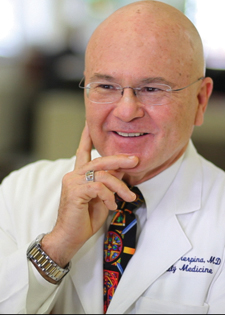 BY Victor S. Sierpina, MD, ABFM, ABIHM, WD and Laura Nell Nicholson Family Professor of Integrative Medicine Director, Medical Student Education Medical Director, Island West Family Medicine Clinic University of Texas Distinguished Teaching Professor
BY Victor S. Sierpina, MD, ABFM, ABIHM, WD and Laura Nell Nicholson Family Professor of Integrative Medicine Director, Medical Student Education Medical Director, Island West Family Medicine Clinic University of Texas Distinguished Teaching Professor
Are integrative medicine approaches useful to the management of post-COVID syndrome? This is an evolving space of clinical and pre-clinical science, so no definitive consensus, adequate randomized trials, or meta-analyses are yet available to answer this question.
However, at this stage we can reasonably adopt some well-established integrative medicine methods to this new condition, offering our patients empathic, holistic, and hopeful options to their ongoing challenges with Post COVID syndrome. Mind-body methods, breathing exercises, dietary, lifestyle, and non-pharmacological methods used in similar chronic post-viral conditions may be the ticket while we await precision science and clinical trials for answers.
A clear example is the use of pulmonary rehabilitation for those suffering from ongoing breathlessness and dyspnea post-COVID. Diaphragmatic breathing such as used in tai chi, yoga, meditative, and mindfulness practices is clearly a safe process and can be an additional benefit to pulmonary rehabilitation.
How about an anti-inflammatory diet for the chronic inflammation imputed to be a cause for the wide range of post-COVID symptoms such as fatigue, brain fog, myalgias, arthralgias, and more? An acupuncture formula called Four Spiritual Wise Men on the crown of the head might be helpful for the brain fog, and I have long found it effective in my CFIDS patients.
Warning: Undefined variable $posClass in /home1/mjhnewsc/public_html/wp-content/plugins/ap-plugin-scripteo/lib/functions.php on line 1078
Let’s back up a bit and review the situation. The following are points quoted from an upcoming chapter in the next edition of Conn’s Current Therapy on Post COVID Syndrome written by me and co-authors Justin Seashore, MD and Sagar Kamprath, MD:
The post-acute COVID syndrome is defined as symptoms extending three weeks to three months after the acute disease and Long Haul COVID syndrome is defined as symptoms persisting beyond three months.
Warning: Undefined variable $posClass in /home1/mjhnewsc/public_html/wp-content/plugins/ap-plugin-scripteo/lib/functions.php on line 1078
Predominant symptoms are new-onset shortness of breath, cough, palpitations, fatigue, and brain fog. Other common symptoms include GI disturbances, headaches, hair loss, new-onset non-descript pain, depression, anxiety, and post-traumatic stress.
Results of testing are not part of the current definition as many patients were not tested and are or were asymptomatic carriers.
Warning: Undefined variable $posClass in /home1/mjhnewsc/public_html/wp-content/plugins/ap-plugin-scripteo/lib/functions.php on line 1078
The broad spectrum of clinical manifestations of Post-COVID Syndrome should encourage clinicians and medical educators to include it in the differential of any of a number of new or worsening complaints.
Evidence for optimal management of Long-COVID may be lacking at this time but is evolving with best practices being described by multiple professional bodies.
Multidisciplinary management and rehabilitation are essential to whole-person care.
Organ and system-specific care is appropriate and must be prioritized as to serious vs. milder long-term problems.
Self-management and peer support can play important roles and must include shared decision-making.
Over the past year and a half, we have endured an ever-changing multimodal disease process, devastating millions of people not only due to severe infection but also with mild or asymptomatic forms of the disease including younger patients. Our understanding and definitions of what spectrum of conditions the Post-COVID Syndrome (PCS) or Long Haul COVID encompasses are in the stage of medical discovery. Current estimates are between 10-30% of COVID infected patients may be left with residual symptoms. Some studies suggest up to 90% of patients may be affected.
In a recent article in Holistic Primary Care (www.hosticprimarycare.net), a functional medicine approach to COVID long haulers was proposed, elements of which might be considered as we move toward a solution to this troubling condition. The comprehensive treatment plan advocated by Jon D Kaiser, M.D., faculty of the University of California Medical School in San Francisco includes the following suggestions for managing post-viral syndromes:
- Mitochondrial support
- Microbiome support
- Adrenal support
- Deep restorative sleep
- Avoidance of excessive stress
- Prescription medications
- Strategic pacing
- Environmental testing
His observation is that those susceptible to post-viral syndrome have a history of not eating or sleeping properly, chronic stress, and long periods of overextending themselves. This leaves them with stressed mitochondria, adrenals, immune system, and microbiome which when faced with an invader, the “house of cards” falls down. This condition has also been called “host hospitality.”
While his approach and specifics are beyond the scope of this article, he offers a personalized and patient-centered functional approach for patients, a path to recovery based on established approaches to post-viral conditions like chronic fatigue, fibromyalgia, chronic fatigue/immune deficiency from mononucleosis, and CMV viruses. See more information at https://www.jonkaiser.com/blog.
Dr. Kaiser’s scenario also supports what I have long proposed in terms of building immunity to prevent serious COVID infection including good sleep, stress management, an anti-inflammatory diet, and immune-boosting supplements like zinc, vitamin C, fish oil, probiotics, B complex, and elderberry extract. Others like ashwagandha and echinacea may also be considered.
I emphasize that all these approaches are still in the process of discovery and validation and that clinical trials will be needed to establish clear protocols. Such research must address the genotypic, phenotypic, pharmacogenomic, and other personalized variations in disease penetration and management.
And remember to vaccinate and boost.


